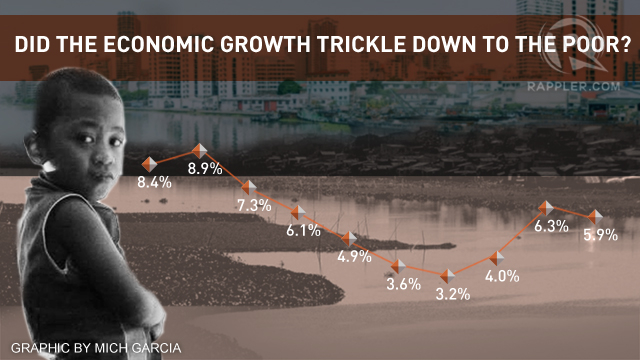SUMMARY
This is AI generated summarization, which may have errors. For context, always refer to the full article.

MANILA, Philippines – Even with high economic growth, the National Economic and Development Authority (Neda) said the Philippines still has a long way to achieving a significant reduction in poverty.
Neda Director General Arsenio M. Balisacan told reporters the recent second quarter growth of 5.9% and first semester growth of 6.1% is not an assurance that the country has made significant progress in reducing the scores of the poor.
“I always like to maintain that you need to grow on a sustained basis to see the impact of this growth on poverty. You see growth but don’t count on it too much,” Balisacan said at the sidelines of the National Income Accounts (NIA) press briefing on Thursday, August 30.
Sustained economic growth
Realistically, Balisacan said the 5.9% growth does not really translate to much in the lives of ordinary Filipinos. He said if the country’s population growth of 1.9% will be taken out of the growth, actual growth in the second quarter was only 4%.
To place a big dent on the country’s poverty rate, Balisacan said sustaining higher growth of about 6% to 7% in the next 5 to 10 years is needed to reduce poverty.
Balisacan added that this high growth must also be accompanied by benign inflation or low commodity prices to allow the poor to benefit from economic growth.
Low- and high-hanging fruits
Balisacan said that to be able to meet the expectations of the international community, who now tout the Philippines as Asia’s bright spot, the country needs to improve low- and high-hanging fruits in development and economic growth.
He said that for one, the government must make sure that its fiscal house is in order. Balisacan noted that this is usually where many countries enjoying high economic growth fail.
The Neda Chief also said the government must invest more in infrastructure and reduce the costs of doing business to place the country within the radar of both foreign and domestic investment.
“There are some low-hanging fruits and high-hanging fruits that we need to address. There are (even) low-hanging fruits (that can help us) make a significant improvement (in doing business) and send the message that we are serious in our business of putting the Philippines on the map,” Balisacan said. – Rappler.com
Add a comment
How does this make you feel?
There are no comments yet. Add your comment to start the conversation.